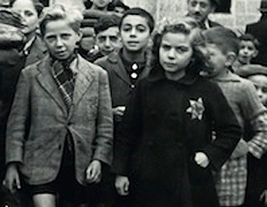Things Could Happen
At what age do we start to tell our children about the terrible things that could happen? We try to keep them innocent for as long as possible, perpetuating stories like Santa and the Tooth Fairy. We encourage their  kindness and fairness, wanting them to believe the world is a kind and fair place. We build a magic bubble around them so they can grow up feeling safe. I’m never sure if we’re investing in their optimism or shielding them from the harsher truth. Maybe a dose of both.
kindness and fairness, wanting them to believe the world is a kind and fair place. We build a magic bubble around them so they can grow up feeling safe. I’m never sure if we’re investing in their optimism or shielding them from the harsher truth. Maybe a dose of both.
Buddy-roo thumped down the stairs for one last goodnight kiss while De-facto and I were watching a movie, arriving just in time to see the scene in which a bold manservant attempts to force himself upon a young maid, who, fortunately, manages to push him off her and escape.
“What was he doing?” she asked as I steered her back upstairs.
“He’s trying to hurt her, but she got away.” I didn’t elaborate, partly because I wasn’t sure how much of the attempted rape scene I wanted to explain to a not-yet-nine-year-old, but also because I wanted to watch the movie, not talk about it.
The next morning she descended for the morning cuddle – these are still happening – and after a moment of wordless staring at the ceiling and listening to the familiar morning sounds of cleaning trucks spraying water in the street and pigeons cooing outside the window, she brought it up.
“Why was that guy trying to hurt the girl in the movie last night?”
These are the conversations I wish we didn’t have to have, but I won’t avoid them. One of the reasons I’ve told my daughters how babies are made is so they know how to protect themselves. I can’t warn them to watch out for strangers, without telling them what strangers might do. They cannot defend themselves from an atrocity like a rape if they don’t know what it is or what to watch out for. I hate to frighten them, but I don’t want them to be in the dark.
I took a deep breath and explained that the mean guy was pushing himself on the young woman because he wanted to have sex with her.

“Why was she fighting him back?” Buddy-roo asked.
“Because she didn’t want to have sex with him.”
“Why didn’t she just say no?”
I explained how there are in the world some arrogant men – boys, too – who think it’s okay to force themselves on a woman. They think if she says no, she doesn’t really mean it. Sometimes they don’t even bother to ask.
“If you’re ever in a situation like this, you have the right to say no. Say it loud and clear, and then get out of there.”
I am lucky to have never encountered such a scenario, but I imagine it isn’t always easy to scream no and get out. The whole subject – whether its date-rape or an attack by a stranger – is much more complex and there is no one right way to escape. You’d want to protect your sexual dignity, but you also might have to save your life, if a weapon was involved. Difficult choices might be required. Things could happen.
~ ~ ~
An exhibit at the Hotel de Ville, C’étaient des Enfants, chronicles the story of the children who were deported to the war camps during World War II. A number of these children disappeared right from our neighborhood; almost every school within ten blocks of our house has a plaque to commemorate the children who were taken. Just a few streets away is the address of the apartment featured in Sarah’s Key, the story of a young girl separated from her family during the Vel d’hiv Roundup when, in the course of just two days, 8,000 Jews were collected and deported.

Last week I took the girls to see it. I could have waited a few days until school started and gone on my own or with De-facto. I knew there’d be haunting images, the kind that can produce nightmares. I knew I was putting a sad and frightening story in front of them, but despite the picture of horrific reality that would be revealed, I felt they should see it.
I had to explain, as we toured the exhibit, why only some of the children in the class photographs had stars sewn on their clothing, how in one case an entire class of students completely disappeared, how some families were surprised in the night and then separated and sent off to camps, how the French police cooperated while many neighbors turned a blind eye.
“How could they let that happen?” Short-pants asked, earnestly.
That’s the question, isn’t it? How could they, a modern society, allow a paranoid politician to rise to power and enact legislation that denies the rights of an entire law-abiding segment of the population? It’s preposterous, that this could ever have happened, and to such extremes. But it did. And not so long ago.
~ ~ ~
These days I read the news, and I must admit, some of it seems just as preposterous to me. For instance, it’s become commonplace for white-haired male politicians to sponsor legislation that has a negative impact on a woman’s right to reproductive health. A candidate who knows little about a woman’s anatomy, let alone the reproductive process – and who, remarkably, sits on a science committee – proclaims that a woman’s womb won’t allow fertilization if she’s raped. Another lawmaker proposed legislation that would criminalize miscarriage and make abortion completely illegal, without exception. The bill didn’t pass, but that it was even suggested, that it could possibly be considered illegal for a woman to choose to end a pregnancy that was a result of a rape, this seems barbaric to me.

These social conservatives would insist a woman give birth to a baby that she never intended to have, whether the result of a rape or a broken condom, and that she cannot afford to raise. Yet they would cut a welfare program that would support her when she doesn’t abort, and they would un-fund an organization like Planned Parenthood which – except in the case of rape – might have helped her avoid the pregnancy all together.
It’s preposterous, isn’t it?
I live in a country where abortion is legal, where a big mistake or a violating incident can be remedied. It’s not without angst – abortion is never an easy decision for a woman – but at least it’s without felony charges. If my daughters stay here, they will have the right to choose. But I fret about what’s happening now to women in the United States, how the rights our grandmothers and mothers fought for – my mother was a supporter of Republican Majority for Choice – like the right to make choices about our bodies, the right to obtain safe birth control, all these aspects of reproductive health that, incidentally, contribute to our economic health, that these could slowly be stripped away. How could we let this happen?
That’s the question, isn’t it? How could we, a modern society, allow paranoid politicians to rise to power and enact legislation that denies the rights of an entire law-abiding segment of the population? It’s preposterous, that this could happen. But could it?


September 6th, 2012 at 1:29 pm
Thanks, well written and it appears that things are truly going backwards in some circles. I know these are the people who believe that women should stay at home with “a bun in the oven”. Thanks for expressing what any sane woman would believe. My uterus, not yours!
September 6th, 2012 at 10:56 pm
Well done. This topic has come up a lot for me lately with the election in full swing and I’ve worried that it could happen here (the US) until the recent Susan G. Koman fiasco. Did it make the news there? The huge, well funded SGK organization announced they would no longer support Planned Parenthood as they provide abortions. The uproar was instantaneous and viral and it ended, once and for all, my ambivalence about the Internet. Millions of private, not-the-protesting-type women went to their computers and spoke loudly and clearly. SGK caved within a day and reversed their decision. If anyone thinks they can take away our right to make our own healthcare decisions, they’ll have to take away our computers first…sanity reigns. Sus.